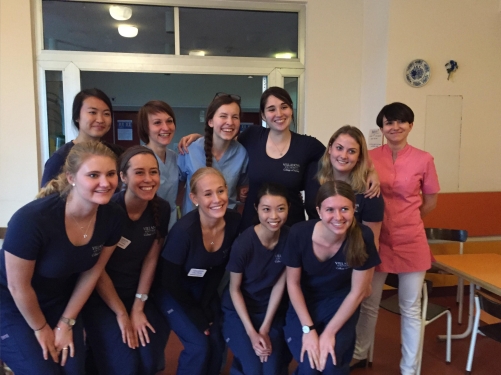Students enhancing their view of health in Poland

In May 2016, countless hours of research and planning concluded with a life-changing clinical field experience in international nursing for eight junior and senior nursing students. They, along with Dr. Elizabeth Blunt and Dr. Sherry Burrell, set out to experience the socio-cultural dimensions of health and illness as well as the systems used to deliver nursing and health care in Poland.
The itinerary included cultural and educational opportunities that provided a chance for the nursing students to interact with, as well as observe, health care practices in Poland.
Villanova students travelled to two universities in Southern Poland. Their first stop was at Bronislaw Markiewicz State School of Technology and Economics (PWSTE) in Jaroslaw where students presented at the 4th International Conference on Health, Illness and Beauty. The students presented in groups on a variety of topics, the Polish nursing students found all the topics intriguing but were particularly interested in the presentations on A comparison of nurse midwives in the United States and Poland, Human Trafficking, LGBT issues in healthcare and Immigration in the United States: The Mexican border.
Jagellonian University in Krakow, ranked the #1 College of Nursing in Poland, is currently conducting research, in conjunction with the Wieliczka salt mine, on the benefits of curative and preventative therapy programs for patients with respiratory diseases such as asthma. Students were able to tour the respiratory health centers, which are located in the 3rd level of the mine, approximately 300 hundred feet underground. The uncontaminated environment in the mine is thought to help promote respiratory function and decreased respiratory disease.
This experience was a favorite of the students because according to Melanie Narayil, junior nursing student “the concept of therapy in a mine was entirely new to me and I was surprised to learn about the benefits of therapy in the mine and enjoyed practicing breathing exercises there.”
The Villanova students were happy to share a new perspective with the Polish nursing students, and welcomed any insight in return on what being a nurse in Poland entails. Education between the students varied greatly and senior nursing student Agnes Tran was surprised to learn that “Polish nursing students go to clinical nearly 40 hours a week along with hours in the classroom whereas we go to clinical 12 hours a week. I also learned that Polish nurses are underpaid. Many of the Polish nursing students want to move to the UK to work in order to make more money. It saddens me to learn that Poland is losing its nurses and nothing is being done about it.” Polish nursing students were eager to learn how to provide quality nursing care to diverse populations, now more than ever, with the influx of refugees in Eastern Europe. This was a teaching opportunity for the Villanova nursing students to draw on their own clinical experiences and convey what it means to be culturally competent to the Polish students.
Dr. Blunt and Dr. Burrell went to great lengths to ensure the students were able to experience all that Poland had to offer. They took the time to visit important historical landmarks, such as visiting the Auschwitz and Birkeneau concentration camps, as well as the Markowa museum where Polish citizens killed by the Nazis in World War II are honored. Faculty and students at Bronislaw Markiewicz State School of Technology and Economics hosted a wild boar roast for the Villanova group at a hunting lodge in the woods where they feasted on wild boar, kielbasa, chicken and other Polish specialties.
It was an unforgettable trip for the nursing students and each one took away something that they feel will make them a better nurse in the future. Senior student Chelsey Clark is already making plans on how she can put this newfound knowledge to good use, “My experiences in Poland will help me provide more sensitive care to my future patients – taking my time to ensure understanding and clarify when necessary, understanding when a translator may be needed and knowing where my hospital’s translating resources are located, and respecting the needs of those patients who believe in more than one type of medicine.”
